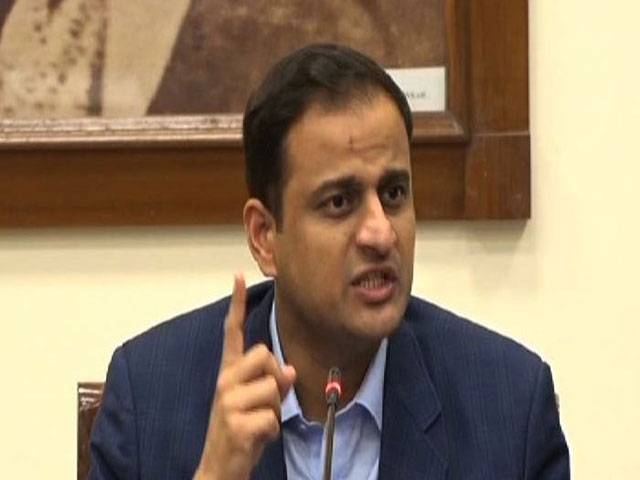Karachi - Sindh government spokesperson Murtaza Wahab said yesterday that the province had nothing to do with the sugar crisis regardless of what the inquiry commission reported since it last approved a sugar subsidy in 2017.
“We did not approve any sugar subsidies in 2018, 2019 or 2020. It was last issued in December 2017, fixing the sugar wholesale price at Rs50.10 and retail price at Rs53 which was reduced to Rs51 in March 2018,” Wahab said.
The spokesperson for Sindh government was addressing the media flanked by Information Minister Nasir Hussain Shah.
He said the subsidy issued by the province not only stabilised sugar price, but also was lower than the previous cost. “The statistics speak for themselves. The province’s farmers and public benefited [from the subsidy] unlike the Centre that fixed the price at Rs80,” said Wahab.
He said the inquiry commission summoned Chief Minister Murad Ali Shah on May 11 while concluding its report, but the CM did not appear before it because it was mainly based on 2019.
The Constitution only grants the federal government authority to import and export and the commission has itself concluded that the sugar crisis developed due to lack of supply because around one million tonnes of sugar was exported. This is why, Wahab said, the CM decided not to appear for questioning since he had nothing to do with trade.
The evidence collected by the inquiry commission shows that sugar mill owners in Pakistan made Rs300 billion in profit in one year, which came from the pockets of farmers and taxpayers. Special Assistant to the Prime Minister on Accountability Shahzad Akbar held a press conference on the inquiry’s findings on Wednesday where he shared details of the Rs4.12 billion subsidy given by the Sindh government and said it was designed to benefit the Omni Group, which alone availed more than a quarter of the pie.
However, the Sindh government said it approved the subsidy on the basis of impartiality back in 2017.
Wahab said the provinces kept warning the government departments about the crisis but no action was taken. Nasir Shah also weighed in on the inquiry’s findings. “[PTI’s] manifesto was something else. They portrayed themselves as angels and criticised the PPP and PML-N, but their own people are involved in malpractices,” he said.
The PPP demanded Prime Minister Imran Khan and the federal cabinet be held accountable for approving the export of sugar and freight subsidy of Rs2bn.
“There are various problems with the TORs of the commission,” he said. “The name of the chief minister who was to be summoned, has not been included. The prime minister, who approved sugar subsidies, has also not been mentioned,” said Shah. Referring to PTI leaders Khusro Bakhtiar and Jahangir Tareen being the ‘talk of the town’ these days, the information minister said that their sugar mills received lion’s share of the subsidies.
“More than 84 percent of the sugar subsidy was given [by Sindh government] to sugar mills of Jahangir Tareen and Khusro Bakhtiar and other people,” he underlined. “This subsidy was given because sugar mills had sugar in abundance hence they did not want to start the crushing season,” said Shah, adding that subsidies were given to the sugar mills to encourage them to export their excess sugar and buy the commodity from local farmers.
“PPP did not give subsidy to just one businessman or mill. The Omni Group was given fifteen percent subsidy as compared to other sugar mills which were given 84 percent.
“If the federal government has overcome the crisis then why is sugar being sold for over Rs 80 per kilogram?
“The Sindh government is being bashed over the sugar inquiry report whereas those who have been held responsible by the commission are not being mentioned.
“Subsidy was given on sugar in Sindh due to excess production. The provincial regime has been taking measures to counter novel coronavirus since February 26 and using all its resources in this regard.”
“This subsidy is given and other benefits when the demand for sugar is low in the international market,” he noted. Shah lashed out at the government, wondering why the price of sugar had soared to Rs80 per kilogramme during the PTI government’s tenure.
Murtaza Wahab thanked the federal government for issuing the sugar inquiry commission report after which it was possible to ascertain that the prime minister himself gave the approval for the commodity to be exported.
“The subsidy was given to 26 sugar mills in Sindh,” he said. “The subsidy was granted in an impartial manner and the purpose behind it was to protect the interests of our sugar growers,” he said.
He said that the prices of sugar had not only stabilised but also dropped when Sindh government provided the subsidy to mills. “The benefit was availed by the sugar growers and the consumer who bought sugar [due to the low prices],” he said.
Reading from the sugar inquiry commission report, Wahab pointed out that the commission had found out that the prime minister approved the export of 1.1 million tonnes of sugar and the Rs2bn subsidy on freight as well.
“This is not me saying this. This is not the Sindh government saying this. These are the findings of the commission formed by the federal government,” he said.
The federal government believes in bad intentions. It wanted to save the prime minister and the cabinet hence, in an attempt to divert the issue, they went into the past,” observed Wahab, adding that for a transparent inquiry to take place, the prime minister should be asked why he allowed sugar to be exported which ultimately caused its price hike and approved freight subsidy of Rs2b.






